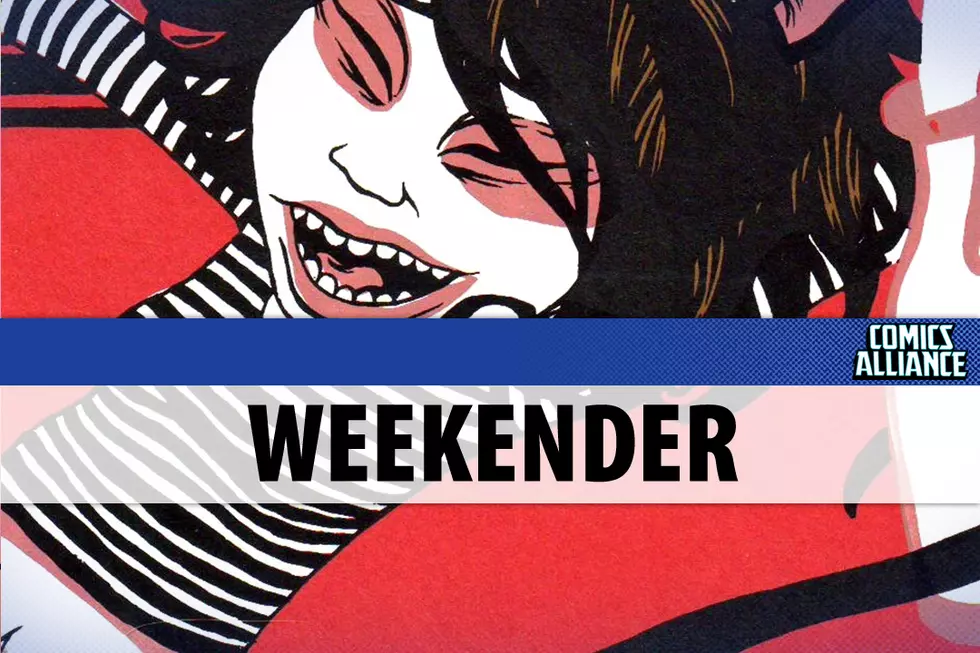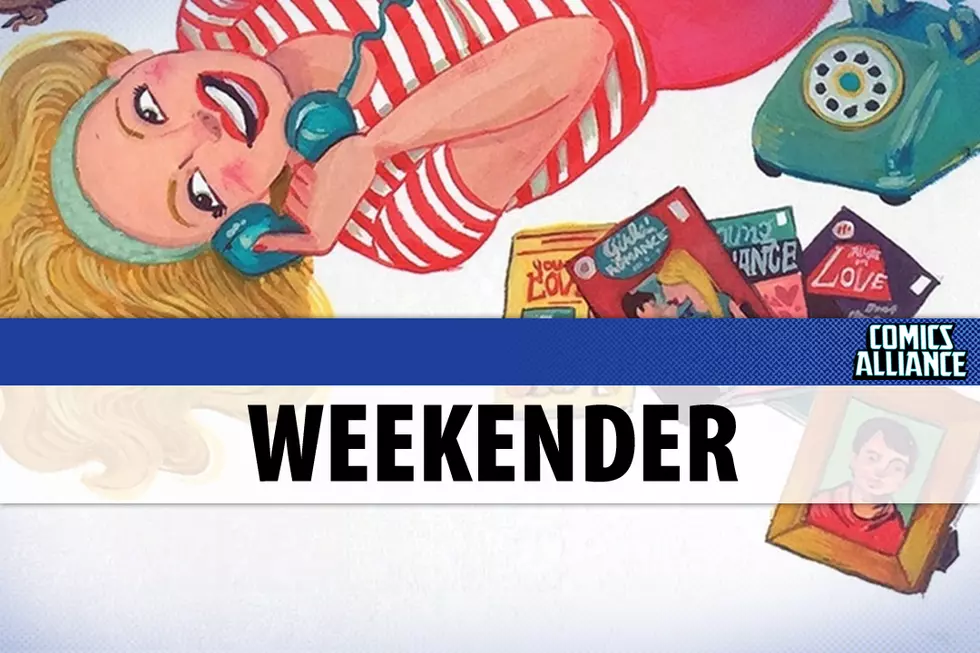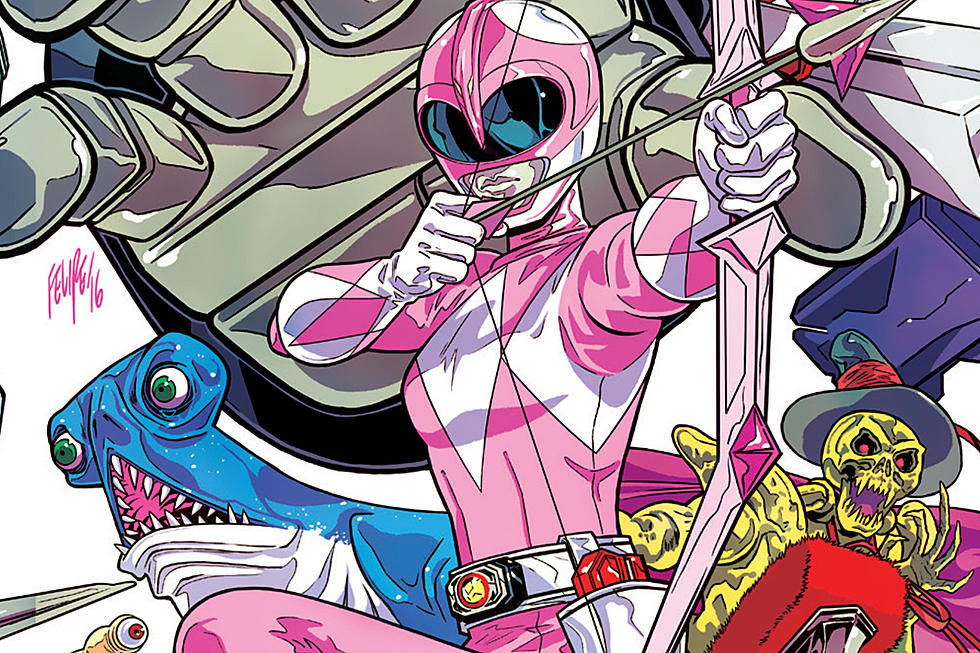![Timeless Fantasy And Indie Innovation: Wendy & Richard Pini On 36 Years Of ‘Elfquest’ [Interview]](http://townsquare.media/site/622/files/2014/08/CA_PiniHeader.jpg?w=980&q=75)
Timeless Fantasy And Indie Innovation: Wendy & Richard Pini On 36 Years Of ‘Elfquest’ [Interview]
When Wendy and Richard Pini released the first issue of Elfquest in 1978, the landscape of the comic industry was wildly different. The "direct market" model of retailing was still in its infancy, with a loose network of regional companies distributing titles to comic shops around the country, and there was a sharp divide (in both content and style) between the mainstream superhero titles of Marvel and DC, and the adult-themed "comix" from underground publishers. Star Wars was a pop culture sensation, and the public was hungry for more adventure, seeking out all manner of sci-fi and fantasy in theaters and bookstores.
It was the perfect moment for Elfquest to appear, and almost immediately, the Pinis had a best-selling comic on their hands. Within a few years, they sparked a second revolution, collecting Elfquest in a series of full-color paperbacks that pioneered the influx of comics into mainstream bookstores, and effectively laid the groundwork for the graphic novel market.
Now, 36 years later, they're still working on their signature creations, and have partnered with Dark Horse to publish a new series, Elfquest: The Final Quest, as well as new collections of the original series and a special "Gallery Edition," shot from the original artwork. ComicsAlliance got the chance to catch up with them at the Dark Horse booth at San Diego Comic-Con, and discuss how Elfquest has impacted the world of comics, both creatively and business-wise.

ComicsAlliance: Elfquest is possibly the single longest-lived success story of independent comics. People talk about the black and white comic boom of the '80s that followed the success of Teenage Mutant Ninja Turtles, but Star*Reach and Elfquest sort of invented the entire indie market, and were at the forefront of a black-and-white revolution in the late '70s – comics that were self-published, but no longer underground.
Wendy Pini: That’s right. They were on ground level.
CA: So you started out self-publishing issues in black and white, and then within a few years, you started releasing oversized full-color collections. How did that come about, and what was your inspiration for collecting your stories in that format?
Richard Pini: Well, very simply, when we started publishing Elfquest in 1978, Star*Reach and First Kingdom were our models, because Bud [Plant, First Kingdom distributor] and Mike Friedrich [Star*Reach publisher] had already been doing this for a couple of years. We had no clue. We used their comics as a model to mock up our own. We did Elfquest for several years in our black-and-white, newsprint, shloppy 32 page package.
And then in 1981, we were approached by another company, who at that time was known for putting together – you know how towns would put together a history and try to sell everybody in that town "this is the history of our town"; that’s what this company had been known for. They were called The Donning Company, and they were kind of interested, nibbling around the edges of comics. They approached us and said, “We would like to collect the first five issues of Elfquest between covers, have you color them, and we will supply those to the comic shops, but also get them into bookstores”.
WP: More than that, they got them into airports, and really interesting venues.
RP: Anywhere there was a mass market outlet for books back in 1981 [that] they had distribution into. We did not. So we were intrigued, and we said yes. And they put out the first volume, which is one of the ones that you remember, and it sold like gangbusters. Nothing like that had ever happened before with comics.
WP: Well, in America. I mean, in Europe…
RP: In Europe, the bande dessinée was, of course, a very respected art form, and the collections were very well known. But in the US, the only thing that had appeared that was similar was from, I think, Marvel. They would collect some "Here Come The Superheroes, Here Come The Superhero Women." There’d be some stories, and they’d be between covers, but that was the only collections of comic that bookstores had seen, prior to Elfquest.
CA: And even beyond that, my recollection is that Elfquest was the first time I’d seen a comic that wasn't just filed in the humor section. The Marvel books were filed next to Garfield and Ziggy, and Elfquest was in with the sci-fi books, and that just had such an impact on me…
WP: Yes!
RP: That’s absolutely correct. And that was a revelation not only to us, but to many, many hundreds of thousands of readers who bought those books, because those were the numbers of our sales, and there had not been anything like that in comics related books before. We like to say that the reason you can go into a Barnes & Noble now and see graphic novel sections, plural, is because in 1981, Elfquest hit the bookstore market like a bomb... Well, that’s not the right word. “Bomb” implies failure.
WP: No, no, like a nova blast!
RP: Like a nova blast, yes.
WP: I don’t think it’s far-fetched to say that Elfquest launched the graphic novel market in big chain bookstores, and in America.
RP: And because despite the fact that there were independent comics before Elfquest, despite the fact that there were collections of comics before Elfquest, despite the fact that there were even graphic novels before Elfquest – Will Eisner’s A Contract With God as a book -- despite all of those predecessors, it’s numbers that catch the attention of the bean counters, and Elfquest was the one that blew the doors open, and said, “Guys, there are a lot of people hungry for this.” And that’s when you started seeing more and more of these collections and more and more of these books.
WP: Well, see, the history of Elfquest all has to do with timing. And none of our skills or wisdom is involved in that. It is purely the universe’s joke on us. The stars just aligned for us at every phase. At first it was just getting started with publishing the comics ourselves, and we happened to know two distributors who knew my reputation as an artist, and they were willing to take our entire idiotic print run, which was like 10,000 because we didn’t know any better.
Nobody was doing that kind of run back then independently. We just did it because that was the number we did. And [distributors] Phil Seuling and Bud Plant took the entire run between them and it sold out in two months.
And all of this was about timing. The stars had aligned. The American public was ready for a big, high- fantasy adventure. They were eating up Star Wars right then, and so they were looking for these big fantasy adventures, and we just happened to be able to supply one.
CA: Yeah, Elfquest and Ralph Bakshi’s Wizards and Lord Of The Rings both came out right at that time…
RP: Yes. Star Wars hit so big. Bakshi’s Wizards was at that same time, and those two things said to the public at large, “Hey, this stuff is okay. It’s okay to watch science fiction. It’s okay to like fantasy.”
WP: It was the beginning of a pop culture. Prior to that, it was very much a thing you read under the covers with a flashlight. And Star Wars and Lord Of The Rings and Wizards, and all that stuff just… It was a big change. You could just feel it in the air.
RP: Plus, there was not, before then -- and there still is not today -- anything like Elfquest. We were just talking with someone who said that the longevity and the appeal of Elfquest comes from the wonderful conflict between characters who are sexy-looking, but – the word “cute” gets applied to Elfquest a lot, sometimes disparagingly.
WP: Cute, childlike, harmless, you know.
RP: But they’re kind of inoffensive, pleasant-looking characters, coupled with, I think it was described as a very masculine, muscular storyline. And that had never been seen before, and I can’t think of anybody who’s really doing it the same even now.
WP: No, that’s true. But you see, that’s the influence from Tezuka. I’m a Tezuka child. Tezuka created Astro Boy, Kimba The White Lion, Phoenix – the list goes on and on and on. The characteristic of Tezuka that caught me back in the '70s -- when I could get a hold of his material, because it was very hard to get a hold of manga back then -- was that he would take these charming, doll-like characters, and put them through hell!
And the contrast of that, that you never knew if one of these adorable characters was going to live or not or get blown off the face of the earth, and the tension of it was so extreme, because we human beings are hard-wired to look at a cute, rounded doll-like character, and go, “Oh, the baby.” You know? And you think then it’s going to be a childlike story. And then when awful things happen to these characters, it hits you very, very hard. So that’s what excited me about Tezuka’s work. And that’s why I call myself a child of Tezuka, because that’s the kind of story I always tell.
CA: And then, you got those books in bookstores. I remember seeing them in everything from Waldenbooks to airports to the hippie and new age bookstores… I saw it everywhere. But it wasn't actually carried in many comic shops, and didn't have a presence on spinner racks until Marvel picked it up. And it was weird, because all of a sudden lots of comic readers that I knew were suddenly saying, “Have you seen this new thing?”
RP: Exactly. And by the time we finished the first series of Elfquest in 1984, we were shipping off the press 100,000 copies of each issue.
WP: We were outselling some of the X-Men.
RP: We were outselling some of Marvel's X-Men titles or DC's Batman and Superman titles. Not the first line, but the second line books from those companies. But the one thing that we never had was newsstand distribution. And when Marvel’s Epic line of comics started up, and they approached us, which was delicious irony because they had turned us down seven years earlier, they got Elfquest into places – the spinner racks at supermarkets and newsstands and the drug stores, and that’s how a lot of people first discovered it.

CA: And from there, it just grew. You continued the story across a few different series, and while you brought in some other creators to do New Blood and Wave Dancers and the '90s color line of books, you keep returning to these core characters time and time again. This seems a very personal thing. How do you…
WP: Well, you’re exactly right, and it’s not so much a return, it’s ongoing – it’s always been an ongoing story.
RP: It’s called The Final Quest, but it’s not the end of Elfquest.
WP: It’s the end of a big cycle of a hero’s journey that we’ve been taking on.
CA: So have you had the outline of whole story in mind all along, or does it continue to grow and change as you grow and change?
WP: The plot of The Final Quest has been worked out since the mid-'90s. We’re only getting to it now. And we never knew how we were going to get to it, and whether we were going to publish it ourselves or whether we were just going to put it up online. And now, I mean, it couldn't be a more ideal situation than with Dark Horse…
RP: I'm going to step back a little bit further. Wendy says it’s been in place since the mid-'90s, but the events of the final quest wrap up threads that we introduced in the original story in 1978.
WP: We've been planting clues all through the 35-plus years.
RP: There’s a core group of characters, and they are on a mythic journey, as Joseph Campbell would say, a hero’s journey. And we have been weaving that – despite the side issues, and the other creators, and the storylines, which were a lot of fun and sometimes feed into that – this main group, and especially the main lead character has an arc, a story arc, and…
WP: Yeah, Cutter and Leetah and Skywise have always been the heart of the story.
RP: It started in ’78, and we’re going to tie all those loose threads together by 2017. That’s why we’re calling it The Final Quest, because it wraps up those threads. Elfquest is a huge world in time and space, and there’s more stories to tell. But this is the very personal journey that we as creators of these characters have been on, for going on 40 years.
CA: And now that Dark Horse is bringing the original series back into print in their archival format, and you’re doing The Final Quest with them, and you’re putting out the gallery edition, are there plans for more projects or other Elfquest reissues?
RP: Absolutely. In fact, we’re talking now. We've done the first big phone book volume, there’s another one of those coming out, I think early next year. So now, what is going to be volume three and four and five and six? What are we going to put into those? We're meeting about that.
CA: Do you have the rights to all the novels and short story collections as well?
RP: Everything… the short answer is absolutely yes. The three novelizations, plus the five short story anthologies, plus the sixth which was never published, but I have the stories. And we have the rights to all of those, and if there’s a way to get it out there, we want to get it out there.
WP: We've got a game coming up, too.
RP: A playable card game. And who knows? My next thing is, you know these Funko bobbleheads?
CA: Yes...
RP: I want Elfquest bobbleheads!
WP: Well, Dark Horse has put out these amazing ceramic figurines, and we’re also going to be talking to them about bringing out more…
RP: More stuff.
WP: We are wonderfully excited, because if someone had told us in 1978, “You’re starting off on this journey with this story, and 35-plus years later, you’re going to be working harder and doing more with this story than you are right now.” Do you think…would you have believed it if anybody had said that to you? We first started all this as a hobby.
CA: Well, for a hobby, it turned out pretty well, I’d say!
RP: I would say so! We couldn’t be happier here and now than where we are.
WP: Oh, yeah. Dark Horse is a great place to be.
More From ComicsAlliance

![What Happened to All the Movie Panels in Hall H? [SDCC 2016]](http://townsquare.media/site/442/files/2015/07/comicconposter.jpg?w=980&q=75)







